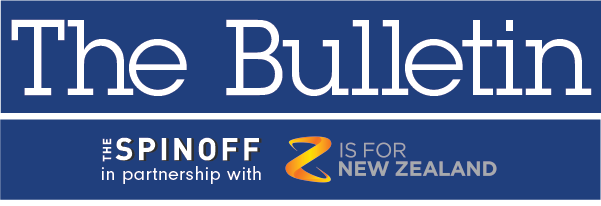Year closes with government books in reasonable shape
Unemployment will not hit the damaging highs that were forecast earlier in the year
Good morning and welcome to The Bulletin for Thursday 17 December, by Alex Braae for The Spinoff. Presented in partnership with Z Energy.
In today’s edition: Year closes with government books in reasonable shape, Mallard sets record straight, and government bookings filling up accommodation sector.
Image: Finance minister Grant Robertson (Photo: Getty/Hagen Hopkins/Stringer)
The half-yearly economic and fiscal update has been released by Treasury, and the numbers are (in context) remarkably good. Politik has a good wrap of that context, and the key number is unemployment, which has been kept below the dire range that was being warned about earlier in the year. There's a memorable line in the piece which sums the current economic situation up – "simply, the HYEFU shows that the Government has bought its way out of Covid." And it has turned out to be a pretty savvy purchase.
Even so, the future outlook is pretty complicated, and 2021 won't necessarily be an easy year. Analysing the figures, Stuff's Luke Malpass notes suggestions that we're still seeing an effect of displaced spending from lockdowns and closed borders, and that could start to dry up. He also notes that New Zealand "remains at the mercy of the global economic conditions", which means that our trading partners might end up having much less ability or interest in buying our goods. Stuff's Thomas Coughlan reports the economic upside has another effect – house prices will continue to rise much faster than wages, which in turn will deepen inequality.
Speaker Trevor Mallard has appeared before a select committee to set the record straight on payments made to settle a defamation dispute. Stuff's Henry Cooke sat through the whole thing, and it included an admission from Mallard that he almost immediately regretted describing the parliamentary staffer's alleged actions as rape. He also discussed the perception that he had changed the rules so that taxpayers would foot the bill for his legal costs, saying that perception was wrong – the change was in fact made on a bi-partisan basis by former deputy speaker Anne Tolley.
A massive number of bookings from government agencies means the accommodation sector will be close to full this summer, reports Newsroom's Jonathan Milne. That means for those planning on making late bookings, the advice is basically to buy a tent. The bookings are a combination of people needing emergency housing, paroled former prisoners, and returning New Zealanders who don't have anywhere else to stay.
Almost all residents of the Bay of Plenty community of Matatāhave given up their homes, reports Local Democracy Reporter Charlotte Jones. As a result of debris flows down the Awatarariki Stream, residents have signed settlement agreements with the Whakatāne District Council, as part of a managed retreat plan. The story notes what a sad outcome it is for the departing residents, but there seems to be little more that can be done to protect their former homes.
Another interesting bit of coverage about the BIM reports: Greater Auckland has blogged about the briefings given in transport, and particularly what they say about the future of urban transport systems in particular. It also goes into how the transport ministry is forecasting to bring emissions from the sector down.
And another one: Work has resumed on a potential TVNZ-RNZ merger, reports Stuff's Tom Pullar-Strecker. It recommenced in August, after being put on ice following the various issues around Covid that required more urgent attention. Labour's manifesto included a commitment to working towards some sort of new public media entity.
Some housekeeping: Today is the second to last Bulletin of the year, and tomorrow will be the last one. Don’t worry, it’ll be back in mid to late January 2021.
Got some feedback about The Bulletin, or anything in the news?
Drop us a line at thebulletin@thespinoff.co.nz
Right now on The Spinoff: Our political panel has put together their list of champs and flops for 2020. Leonie Hayden reports on allegations made by former staff members at high-profile Auckland bar Hoppers. Justin Latif reports on the clash between a former owner of the NZ Herald and a golf club, over rezoning and rates. Pollster Stephen Mills writes about recent findings that showed more than 70% of the country would take a Covid vaccine. Lucy Revill writes about some of the things that make Wellington still be an exciting place to be. The Spinoff Ātea writes about what will be going in our time capsule to mark the year for Māori. And there's a final episode of Gone By Lunchtime for 2020, with their picks for the biggest winners and losers of the year.
For a feature today, a look from across the Tasman at a story that is also playing out in New Zealand. Australian horticulturalists are having immense struggles attracting people to picking work, and are voicing the same concerns about fruit rotting on the vine. As this piece on The Monthly (requires email registration) notes, the reason why is probably pretty similar to what stops people doing that work here. Here's an excerpt:
I picked cherries over two recent summers. Harvesting the red gems in Tasmania is very different from picking mangoes in Daly River, strawberries in Bowen or bananas in Carnarvon, but given that the loud voices dominating public discourse – agribusiness heads, farmer lobby group representatives and wide-hat politicians – have rarely undertaken casual fruit picking themselves (although Littleproud claims experience with watermelons), it is important that more pickers get a say.
The reason I decided not to pick fruit again is that the “lug” rate, the payment received for each box of cherries, had not increased in 20 years. This reflects the fact that the return is set by the orchard owner (often large investors) without oversight or involvement by a union, state regulator or the Fair Work Commission. Almost no one among the 100 plus workers in the orchards I worked in averaged the minimum wage for the total time they worked. It was true that on days when all the stars aligned – weather, bountiful trees, healthy fruit – it was possible to earn more than this. But that was not the norm.
The America's Cup is now underway – or at least, actual regattas in advance of the challenger series are. And Emirates Team NZ may not be as invincible as they appeared to be, if a practice win by the syndicate skippered by Dean Barker is anything to go by. Stuff has an analysis of the current form guide, and the races that will take place over the coming weeks. It's useful, because after all we're back onto the four-yearly cycle in which we all have to become experts on the intricacies of sailing.
That's it for The Bulletin. If you want to support the work we do at The Spinoff, please check out our membership programme








